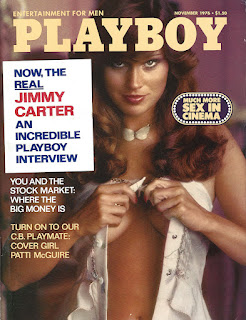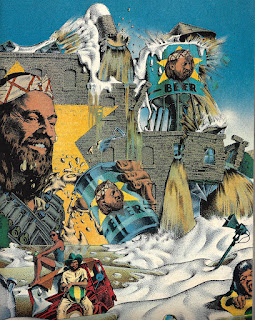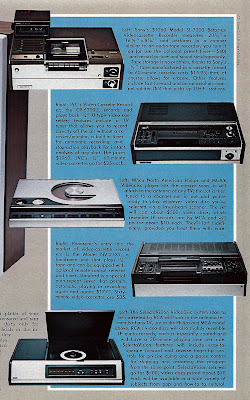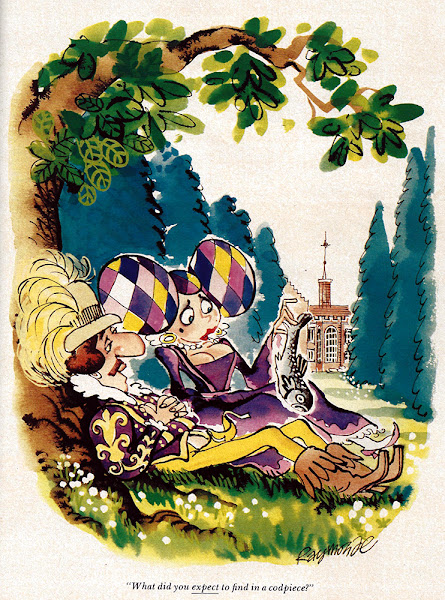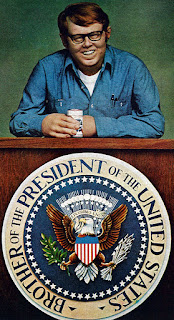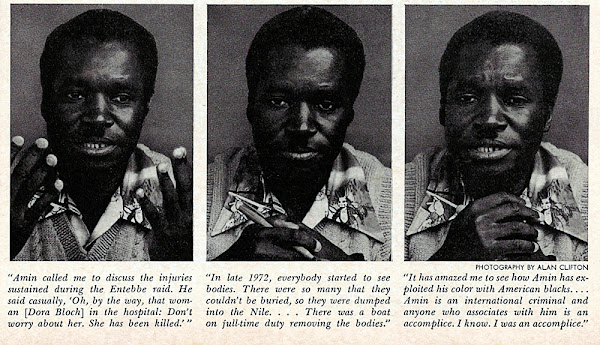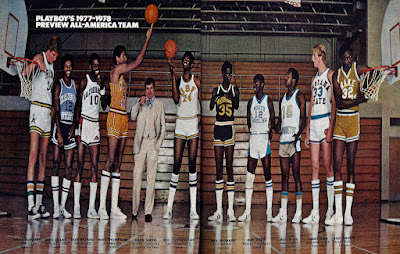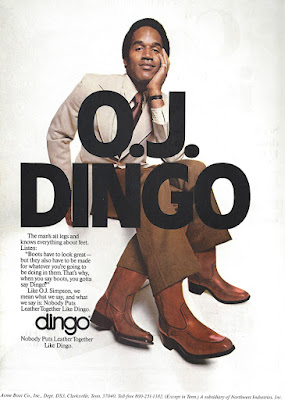My wife, Lisa, has acquired a large collection of vintage
Playboy magazines. I'm flipping through those issues that catch my attention and offering my thoughts on the non-photographic content that filled its pages. You know, the articles.
Highlights: I just learned something of significant import--the very first Playboy interview appeared in the September 1962 issue. It was conducted by the legendary author Alex Haley with the equally legendary musician Miles Davis. Before that, Playboy did not run interviews. This issue is from April of that year, and let me tell you folks, the absence of the famed interview is sorely noted. Up to this point, I did not realize how essential that feature had become in my exploration of back issue articles. That's not to say there's no thoughtful prose here, but rather, nothing quite so immediate and arresting.
The cream of the crop this outing may be Arthur C. Clarke's science column, "You Can't Get There From Here" in which the famed author considers the challenges of "probing the proximate regions of Earth and sun." The science is, of course, dated--at once point Clarke references Mercury as being tidally locked with one side of the planet always facing the sun with the other side perpetually facing away--but it is all intelligent and even heady subject matter, which makes me wistful for a time when popular science articles were, well,
popular reading. Here are some selections that stood out for me:
At the Earth's center, the pressure is estimated to be over 3,000,000 tons per square foot, or 3000 times that at which Trieste [the first bathyscape to descend into Challenger Deep] encountered.
Under such pressures, rocks and metals flow like liquids. In addition, the temperature rises steadily toward the interior, reaching perhaps 6000 degrees Fahrenheit at the center. It is obvious, therefore, that we cannot hope to find a ready-made road into the heart of our planet, and the old idea of a "Hollow Earth" (once put forward as a serious scientific theory) must be reluctantly dismissed--together with a whole host of subterranean fantasies such as Edgar Rice Burroughs' At the Earth's Core.
It makes me happy to know Clarke enjoyed reading Burroughs. Clarke goes on to discuss the impossiblity of physically exploring the mantle and core of the Earth but then posits
indirect observations. Gravimetric and seismic obvservations have given up amazingly detailed (yet incomplete) understanding of the interior of not only Earth, but also the moon, Mars, Venus and outer planets and their satellites as well, something that would've surely stunned 1962 Clarke.
Something equally penetrating is that most peculiar and elusive of atomic particles, the neutrino. All other particles are stopped by a few inches, or at most a few feet, of materials such as lead. But the incredible neutrino, having no mass and no charge (to put you out of your misery, it does have spin), can shoot through lead 50 light-years thick without being noticeably inconvenienced. Torrents of them are sweeping at the velocity of light through our so-called solid Earth at this very moment, and only one in a million million notices the trifling obstruction.
And finally...
Ray Bradbury, in his short story The Golden Apples of the Sun, described the descent of a spaceship into the solar atmosphere to obtain a sample of the Sun (which we now know, incidentally, to be 90 percent hydrogen, 10 percent helium, plus a mere trace of all the other elements). When I first read this story, I dismissed it as charming fantasy; now I am not so sure. In one sense we have already reched out and touched the Sun, for we made radar contact with it in 1959--and how unbelievable that would have seemed a generation ago! Even a close physical approach no longer seems completely out of the question, thanks to the development of the new science of plasma physics, born within the last 10 years.
Now, 62 years later, I can only wonder what Clarke might's thought about the
Parker Solar Probe
Other thoughts: In the absensce of an interview,
Playboy fills the void with fiction:
four pieces to be exact, which surprised the heck out of me. The selections include part 1 of "The Wonderful Clouds" by Françoise Sagan, "The Stancias' House" by Paul Darcy Boles, "A Way to Make It" by Henry Slesar and "Adam Frost" by Vance Aandahl. Fiction must've been held in higher regard back in the day.
The Lenny Bruce ad to the right caught my eye, and a quick check confirmed my suspicion that his comedy album,
Lenny Bruce - American is reviewed here. Bruce was a trailblazing topica shock comic who's take-no-prisoners attitude led to multiple arrests for indecency and court appearances.
Americans proved to be the final of his four original comedy albums for Fantasy Records. By 1966 he was dead from a morphine overdose:
Lenny Bruce - American (Fantasy) is the unlikely title of a very likely LP. A stiletto-sharp Bruce discourses (in almost antiseptically expurgated fashion, we might add) on a traumatic gig in Lima, Ohio ("The first day you go through the five-and-10; the next day, you walk through the park and look at the cannon. I stayed at the show business hotel; they got a guy there who's the movie projectionist; another guy sells Capezios. I was held over for spite."), runs through a helpful how-to on the right way to relax colored people at parties (High points of Bruce's party conversation: "Joe Louis was certainly a helluva fighter... That Bojangles sure was some dancer... You all have a natural sense of rhythm... Have you had anything to eat? Can I get you some watermelon and fried chicken?... I'd like to have you over to the house, but I have a sister... But comeon over, anyway--after dark."), offers a ploy to throw a motel desk clerk off the track ("How much is it by the month?"), and delivers a Mexican-American youngster's brotherhood plea to his ethnically-comingled gang ("We all have to stick together--and beat up the Polacks"). Bruce's tag-off is a beautifully enacted travesty of the Hollywood prison movie that is a comedic classic.
All of that may come across as offensive out of context--and even in context, that's the point--but the end result is an Archie Bunkeresque sendup of racists that is pretty funny.
In addition to fiction, you know what else this
Playboy has a lot of? Liquor and cigarette ads. As I despise smoking I have no interest in the Chesterfield or Kent or whatever cancer sticks the ads are selling, but the liquor ads are intriguing. There's a bunch of Scotch ads--
blended Scotch, mind you. There's also a bunch of bourbon ads as well. Many of these brands are fairly obscure, or today known as "economy" buys. Whisky was losing lots of market share to vodka in this era, so all of the whisky ads use ad copy that stress "mild," "light" and even "extra light." Flavor's a dirty word, apparently. One ad that caught my eye (see left) is for Ron Merito. Now, I'm all about rum, but this is one that I've not previously encountered. "It's the finest tasting rum from Puerto Rico" the ad copy claims. So, that puts it alongside Bacardi and Don Q, both represented elsewhere in this issue, with all three positioning themselves as a lightly flavored alternative to vodka. We know that Bacardi succeeded and is now the single biggest rum brand in the world, even if the spirit they produce barely tastes like anything. Ron Merito, however, wasn't so lucky. Vintage bottles from the 1940s seem to be a fairly popular find among vintage spirits enthusiasts, but beyond that I've found little about the history of Ron Merito, its distillery or demise. One assumes they gave up the ghost in the 1970s or 1980s, decades that were not kind to any rum distillers, but that's only a guess. The only thing I know is that it's been gone for decades and I'm curious to learn more about them.
Finally, although this series is about the
articles in these early issues of
Playboy, I'd be remiss if I didn't share at least one airbrushed pinup by Alberto Vargas. Although I feel Gil Elvgren was the absolute master of the painted cheesecake pinup, it's hard to argue that Vargas wasn't the most famous--even moreso than George Petty. The inclusion of Vargas here speaks to
Playboy's very concept and view of itself--its main, perhaps only, competition in these early years was the venerable
Esquire magazine, a lifestyle publication for men that rose to popularity because of, and became known for, the artistic pinups of Vargas. The fact that
Playboy incorporated pinup photography (most of which, in these early years, are incredibly tame by modern standards) but still felt compelled to feature the more vintage-styled work by Vargas speaks to that direct connection and competition between the two magazines. It wasn't until
Penthouse arrived on the scene the following decade that
Playboy radically changed that initial premise and became more explicitly sexualized. I'm sure others have written about this in-depth, so that's all I have to say about that.
Now Playing: John McFarland Provocatif
Chicken Ranch Central








